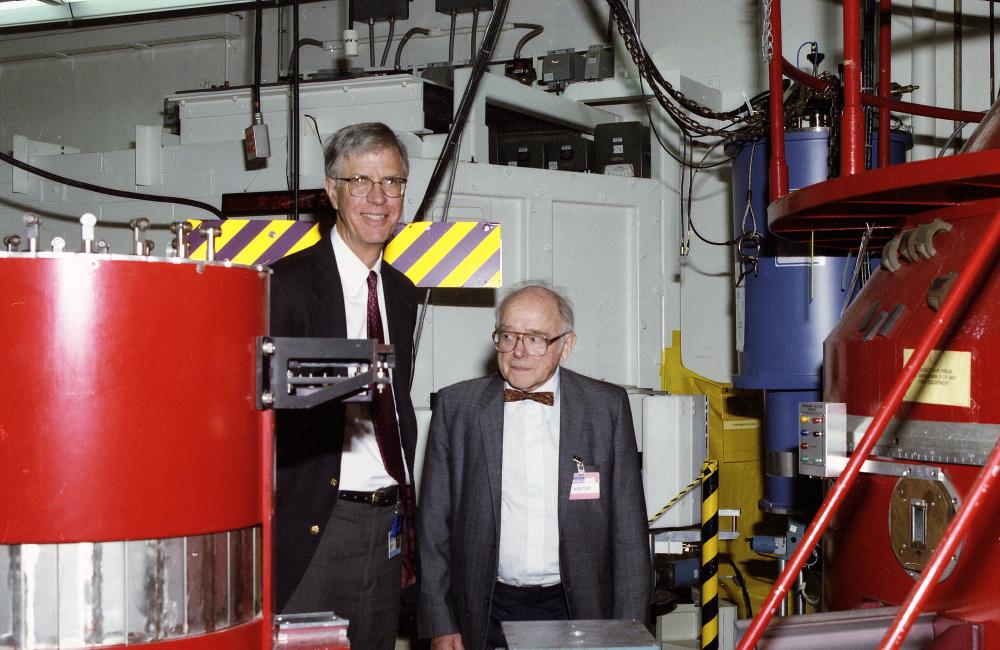Mook, left, with ORNL alum and Nobel laureate Clifford Shull at the High Flux Isotope Reactor in May 1995. Image credit: Curtis Boles, ORNL
Profiles of Scientific Leadership
Herb Mook was a driving force in ORNL neutron science for four decades, a prolific and pioneering experimentalist, and a leader and mentor for generations of neutron scattering scientists.
Mook, who came to the laboratory in 1965, was noted for the quality and creativity of his experimental research.
"Herb had what could be characterized as good taste in science problems," said ORNL physicist Steve Nagler. "He was always working on problems that were at the forefront of physics. He was also an excellent experimentalist, and he came up with really interesting experimental techniques."
Neutron scattering scientist Jaime Fernandez-Baca recalled that when he came to the laboratory in 1986, the section head of the neutron scattering group was another famous scientist, Ralph Moon.
"At the time, Herb Mook was already very well-known," Fernandez-Baca said. "He was an excellent scientist, but he always worked kind of on his own. So when Ralph Moon stepped down, we were all surprised when Herb accepted the position of section head. But he was a great choice because he had the recognition of his peers, he was well-known nationally and internationally, and he brought a great reputation to the group and to the laboratory."
As section head, Mook's devotion to scientific excellence extended to his staff as well.
"Herb always had very high scientific standards," Fernandez-Baca said. "He always encouraged research that was of high impact and high visibility. His rationale was that this type of research would bring professional advancement to the scientist and prestige to the institution."
A leader by example
Colleagues recall that, despite his sterling scientific reputation, Mook wasn't a typical manager.
"As section head, I would say he was he was much more of a scientist than a manager," Nagler recalled. "He basically left you alone as long as you were doing something interesting and productive. He definitely was not a bean counter in any sense, and he was flexible with how you spent your time."
Fernandez-Baca recalled Mook's leadership philosophy: "He would say, 'If I hire the best people, and I let them do their jobs, then I can do my job, and they can do their jobs, and we'll all be successful.' Of course, he kept an eye on what we were doing, but most of the time, he worked on his own. In that sense, he was kind of laid-back, but he always kept an eye on you—even if you felt that he was not."
"In terms of science, he was mostly a leader by example," Nagler said. "In my experience, Herb wasn't a micromanager. He just said, 'Go do something interesting, and the results will speak for themselves.' I never felt like he told me what to do scientifically, ever. It was more give and take.
"He wasn't a very talkative person who was always coming up to chat with you, but if you wanted to ask him a question or get into a discussion, he was open. That's how he shared the way he did things."
Mook's enthusiasm for his own work didn't stop him from being well-connected within the scientific community.
"Herb was a very prestigious scientist, and he had a network of high-level collaborators from around the world," Fernandez-Baca said. "That's how we learned that having a good network of collaborators and peers helps you along in your career. Relationships like these also help you to identify the best research projects and how to get the best outcomes."
Building the science case for the SNS
The crowning achievement of Mook's career at the laboratory may have been his role in getting the Spallation Neutron Source built.
Former ORNL director and head of the Spallation Neutron Source project Thom Mason noted that "Herb was, probably more than anyone else, responsible for me deciding to come to Oak Ridge in 1998. He was one of our most highly cited and respected researchers and played a crucial role in building the science case for the Spallation Neutron Source, in part through the excellence of his own science. “
Mason noted that because Mook was extremely well-respected in the neutron scattering community, he was able to convince them to participate and make their best argument for what experiments they'd be able to do if the SNS was built.
“In that sense, he was our ambassador to the scientific community,” Mason said. “Having someone of his scientific stature really helped lend credibility to the whole effort.
“Herb was an easygoing, laid back, friendly guy, but when it came to doing the science, he pushed really hard to be first and best.”



